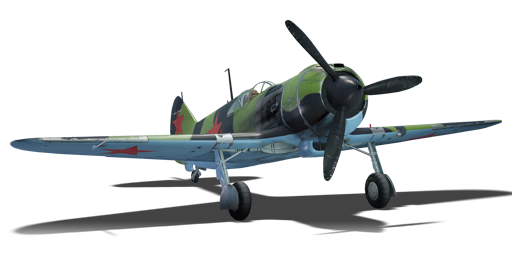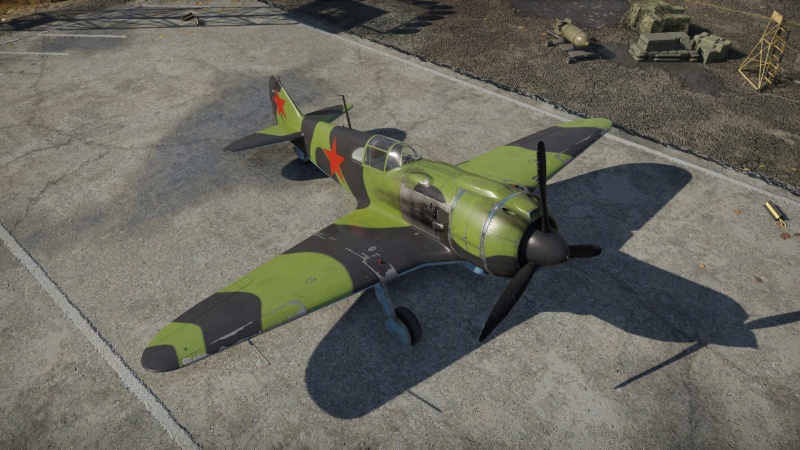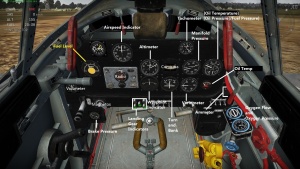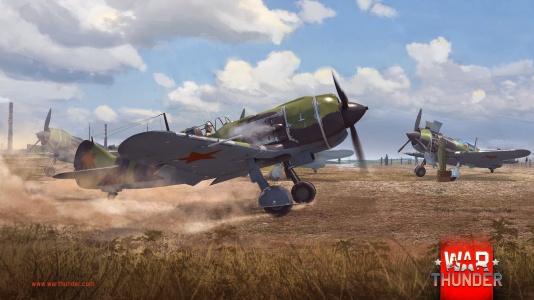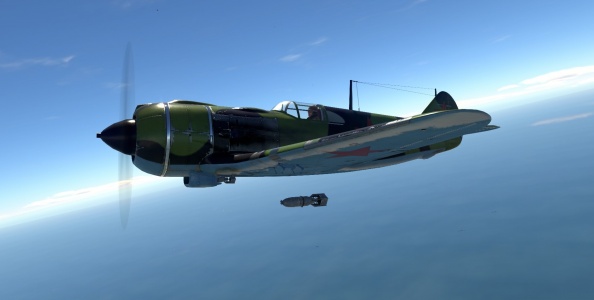Difference between revisions of "La-5"
(Edits) |
|||
| (18 intermediate revisions by 11 users not shown) | |||
| Line 1: | Line 1: | ||
| − | |||
{{About | {{About | ||
| about = Soviet fighter '''{{PAGENAME}}''' | | about = Soviet fighter '''{{PAGENAME}}''' | ||
| − | | usage = other | + | | usage = other versions |
| link = La-5 (Family) | | link = La-5 (Family) | ||
| + | }} | ||
| + | {{Specs-Card | ||
| + | |code=la-5_type37_early | ||
| + | |images={{Specs-Card-Image|GarageImage_{{PAGENAME}}.jpg}} | ||
}} | }} | ||
== Description == | == Description == | ||
| − | <!--''In the description, the first part | + | <!-- ''In the description, the first part should be about the history of and the creation and combat usage of the aircraft, as well as its key features. In the second part, tell the reader about the aircraft in the game. Insert a screenshot of the vehicle, so that if the novice player does not remember the vehicle by name, he will immediately understand what kind of vehicle the article is talking about.'' --> |
| + | The La-5 type 37 was a Soviet fighter plane powered by a 1,700 hp Shvetsov M-82A radial engine. It featured two 20 mm ShVAK cannons and had flight characteristics similar to the Bf 109 F. However, it faced issues like cockpit heat, gas contamination, poor cockpit canopy quality, and low speeds due to canopy regulations. Despite these drawbacks, improvements were made throughout production. The La-5 type 37 entered service in 1942 and a total of 1,021 were produced until the end of the year. Further enhancements were needed for it to match the performance of newer German fighters like the Bf 109 G and Fw 190. | ||
| − | + | It was introduced in [[Update 1.35]]. The La-5 is an energy fighter. While having decent manoeuvrability, it is sluggish when flown at low speeds and suffers from the control surfaces locking up at higher velocities. It is best to gain altitude, stay around 2,000-3,000 m and make short dives on distracted or weaker enemy planes. It has good armament, 2 x 20mm cannons, but a low ammo pool requires good trigger discipline to last the entire match | |
| − | |||
| − | |||
| − | + | == General info == | |
| + | === Flight performance === | ||
| + | {{Specs-Avia-Flight}} | ||
| + | <!-- ''Describe how the aircraft behaves in the air. Speed, manoeuvrability, acceleration and allowable loads - these are the most important characteristics of the vehicle.'' --> | ||
| − | + | {| class="wikitable" style="text-align:center" width="70%" | |
| − | + | ! rowspan="2" | Characteristics | |
| − | |||
| − | {| class="wikitable" style="text-align:center" | ||
| − | |||
| − | |||
| − | |||
| − | ! | ||
| − | |||
! colspan="2" | Max Speed<br>(km/h at 6,200 m) | ! colspan="2" | Max Speed<br>(km/h at 6,200 m) | ||
| − | ! rowspan="2" | Max altitude<br>( | + | ! rowspan="2" | Max altitude<br>(metres) |
! colspan="2" | Turn time<br>(seconds) | ! colspan="2" | Turn time<br>(seconds) | ||
| − | ! colspan="2" | Rate of climb<br>( | + | ! colspan="2" | Rate of climb<br>(metres/second) |
| − | ! rowspan="2" |Take-off run<br>( | + | ! rowspan="2" | Take-off run<br>(metres) |
| − | |||
| − | |||
| − | |||
| − | |||
| − | |||
| − | |||
| − | |||
| − | |||
| − | |||
|- | |- | ||
| − | ! | + | ! AB !! RB !! AB !! RB !! AB !! RB |
| − | |||
| − | ! | ||
| − | ! | ||
| − | ! | ||
| − | ! | ||
| − | ! | ||
|- | |- | ||
| − | ! | + | ! Stock |
| − | + | | 555 || 537 || rowspan="2" | {{Specs|ceiling}} || 22.1 || 22.9 || 9.8 || 9.8 || rowspan="2" | 370 | |
| − | |||
| − | |||
| − | |||
| − | |||
|- | |- | ||
| − | | | + | ! Upgraded |
| + | | 609 || 580 || 20.0 || 21.1 || 18.8 || 13.7 | ||
|- | |- | ||
|} | |} | ||
| − | ====Details==== | + | ==== Details ==== |
| − | {| class="wikitable" style="text-align:center" | + | {| class="wikitable" style="text-align:center" width="50%" |
|- | |- | ||
! colspan="5" | Features | ! colspan="5" | Features | ||
|- | |- | ||
| − | ! Combat | + | ! Combat flaps !! Take-off flaps !! Landing flaps !! Air brakes !! Arrestor gear |
| − | ! Take-off | ||
| − | ! Landing | ||
| − | ! Air brakes | ||
| − | ! Arrestor gear | ||
|- | |- | ||
| ✓ || ✓ || ✓ || X || X <!-- ✓ --> | | ✓ || ✓ || ✓ || X || X <!-- ✓ --> | ||
| Line 73: | Line 49: | ||
|} | |} | ||
| − | {| class="wikitable" style="text-align:center" | + | {| class="wikitable" style="text-align:center" width="50%" |
|- | |- | ||
| − | ! colspan=" | + | ! colspan="7" | Limits |
|- | |- | ||
| − | ! rowspan="2" | | + | ! rowspan="2" | Wings (km/h) |
| − | ! rowspan="2" | Gear | + | ! rowspan="2" | Gear (km/h) |
| − | ! | + | ! colspan="3" | Flaps (km/h) |
! colspan="2" | Max Static G | ! colspan="2" | Max Static G | ||
|- | |- | ||
| − | ! + | + | ! Combat !! Take-off !! Landing !! + !! - |
| − | ! - | ||
|- | |- | ||
| − | | | + | | 735<!--{{Specs|destruction|body}}--> || {{Specs|destruction|gear}} || 431 || 406 || 280 || ~14 || ~14 |
|- | |- | ||
|} | |} | ||
| Line 91: | Line 66: | ||
{| class="wikitable" style="text-align:center" | {| class="wikitable" style="text-align:center" | ||
|- | |- | ||
| − | ! colspan="4" | Optimal velocities | + | ! colspan="4" | Optimal velocities (km/h) |
|- | |- | ||
| − | ! Ailerons | + | ! Ailerons !! Rudder !! Elevators !! Radiator |
| − | ! Rudder | ||
| − | ! Elevators | ||
| − | ! Radiator | ||
|- | |- | ||
| − | | < | + | | < 380 || < 380 || < 380 || > 341 |
|- | |- | ||
|} | |} | ||
| − | + | === Survivability and armour === | |
| − | + | {{Specs-Avia-Armour}} | |
| − | + | <!-- ''Examine the survivability of the aircraft. Note how vulnerable the structure is and how secure the pilot is, whether the fuel tanks are armoured, etc. Describe the armour, if there is any, and also mention the vulnerability of other critical aircraft systems.'' --> | |
| − | |||
| − | |||
| − | |||
| − | |||
| − | |||
| − | |||
| − | |||
| − | |||
| − | |||
| − | |||
| − | |||
| − | |||
| − | |||
| − | |||
| − | |||
| − | |||
| − | |||
| − | <!-- | ||
| − | |||
| − | |||
| − | |||
| − | |||
| − | |||
| − | |||
| − | |||
| − | |||
| − | + | * 8.5 mm Steel - Plate behind the pilot (with "Rear Armour Plate" module added, thickness increases to 10 mm) | |
| − | |||
| − | * 8.5 mm Steel - Plate behind the pilot (with "Rear | ||
* 8.5 mm Steel - Headrest | * 8.5 mm Steel - Headrest | ||
* No armour glazing | * No armour glazing | ||
* Critical components located at the front of aircraft (fuel, pilot, engine, controls) | * Critical components located at the front of aircraft (fuel, pilot, engine, controls) | ||
| + | * Self-sealing fuel tanks, with neutral gas pressurization system (1 below pilot's feet, 1 in each wing) | ||
| + | |||
| + | === Modifications and economy === | ||
| + | {{Specs-Economy}} | ||
== Armaments == | == Armaments == | ||
| + | {{Specs-Avia-Armaments}} | ||
=== Offensive armament === | === Offensive armament === | ||
| − | <!--''Describe the offensive armament of the aircraft, if any. Describe how effective the cannons and machine guns are in a battle, and also what belts or drums are better to use. If there is no offensive weaponry, delete this subsection.''--> | + | {{Specs-Avia-Offensive}} |
| + | <!-- ''Describe the offensive armament of the aircraft, if any. Describe how effective the cannons and machine guns are in a battle, and also what belts or drums are better to use. If there is no offensive weaponry, delete this subsection.'' --> | ||
{{main|ShVAK (20 mm)}} | {{main|ShVAK (20 mm)}} | ||
The '''''{{PAGENAME}}''''' is armed with: | The '''''{{PAGENAME}}''''' is armed with: | ||
| − | * 2 x | + | * 2 x 20 mm ShVAK cannons, nose-mounted (170 rpg = 340 total) |
=== Suspended armament === | === Suspended armament === | ||
| − | <!--''Describe the aircraft's suspended armament: additional cannons under the wings, bombs, rockets and torpedoes. This section is especially important for bombers and attackers. If there is no suspended weaponry remove this subsection.''--> | + | {{Specs-Avia-Suspended}} |
| − | {{main|FAB- | + | <!-- ''Describe the aircraft's suspended armament: additional cannons under the wings, bombs, rockets and torpedoes. This section is especially important for bombers and attackers. If there is no suspended weaponry remove this subsection.'' --> |
| + | {{main|FAB-50sv (50 kg)}} | ||
| − | The '''''{{PAGENAME}}''''' | + | The '''''{{PAGENAME}}''''' can be outfitted with the following ordnance: |
* Without load | * Without load | ||
| − | * 2 x 50 kg FAB- | + | * 2 x 50 kg FAB-50sv bombs (100 kg total) |
| − | |||
| − | |||
| − | |||
| − | |||
| − | == Usage in | + | == Usage in battles == |
| − | <!--''Describe the tactics of playing in | + | <!-- ''Describe the tactics of playing in the aircraft, the features of using aircraft in a team and advice on tactics. Refrain from creating a "guide" - do not impose a single point of view, but instead, give the reader food for thought. Examine the most dangerous enemies and give recommendations on fighting them. If necessary, note the specifics of the game in different modes (AB, RB, SB).'' --> |
[[File:Cockpit_La-5.jpg|thumbnail|right|The La-5's instrument panel.]] | [[File:Cockpit_La-5.jpg|thumbnail|right|The La-5's instrument panel.]] | ||
| − | At the start of the game, climb high and wait for the first dogfight to commence. Once the other planes are engaged, dive on one, fire a good burst, and pull away back to around 3,000 m, and do it again. Shallow dives like this typically best take place at a lower altitude than other boom and zoom aircraft, but here is where the plane's speed will be optimal for manoeuvrability. If you pick up a tail, speeds of around 300 | + | At the start of the game, climb high and wait for the first dogfight to commence. Once the other planes are engaged, dive on one, fire a good burst, and pull away back to around 3,000 m, and do it again. Shallow dives like this typically best take place at a lower altitude than other boom and zoom aircraft, but here is where the plane's speed will be optimal for manoeuvrability. If you pick up a tail, speeds of around 300 km/h (186 mph) are the best for manoeuvring. This plane is one of the first Soviet fighters in the game to have a powerful engine, WEP, and effective cooling. |
The 20 mm cannons are mighty, but low on total ammunition count. Only fly this plane after getting used to the trajectories of the other more forgiving Soviet planes, such as the Yak line, since they use the same cannons. It is typically best to use Ground Target ammo for its high explosive properties. | The 20 mm cannons are mighty, but low on total ammunition count. Only fly this plane after getting used to the trajectories of the other more forgiving Soviet planes, such as the Yak line, since they use the same cannons. It is typically best to use Ground Target ammo for its high explosive properties. | ||
| − | ===Manual Engine Control=== | + | === Manual Engine Control === |
{| class="wikitable" style="text-align:center" | {| class="wikitable" style="text-align:center" | ||
|- | |- | ||
! colspan="7" | MEC elements | ! colspan="7" | MEC elements | ||
|- | |- | ||
| − | ! rowspan="2" |Mixer | + | ! rowspan="2" | Mixer |
| − | ! rowspan="2" |Pitch | + | ! rowspan="2" | Pitch |
| − | ! colspan="3" |Radiator | + | ! colspan="3" | Radiator |
| − | ! rowspan="2" |Supercharger | + | ! rowspan="2" | Supercharger |
| − | ! rowspan="2" |Turbocharger | + | ! rowspan="2" | Turbocharger |
| − | |||
| − | |||
| − | |||
| − | |||
| − | |||
| − | |||
| − | |||
| − | |||
| − | |||
| − | |||
| − | |||
| − | |||
| − | |||
| − | |||
| − | |||
| − | |||
| − | |||
| − | |||
| − | |||
| − | |||
|- | |- | ||
| − | + | ! Oil !! Water !! Type | |
| − | |||
| − | |||
| − | |||
|- | |- | ||
| − | | | + | | Controllable || Controllable<br>Not auto controlled || Controllable<br>Not auto controlled || Controllable<br>Not auto controlled || Separate || Controllable<br>2 gears || Not controllable |
| − | | | ||
| − | | | ||
| − | | | ||
| − | | | ||
| − | | | ||
| − | | | ||
| − | | | ||
| − | | | ||
|- | |- | ||
|} | |} | ||
=== Pros and cons === | === Pros and cons === | ||
| − | <!--''Summarise and briefly evaluate the vehicle | + | <!-- ''Summarise and briefly evaluate the vehicle in terms of its characteristics and combat effectiveness. Mark its pros and cons in the bulleted list. Try not to use more than 6 points for each of the characteristics. Avoid using categorical definitions such as "bad", "good" and the like - use substitutions with softer forms such as "inadequate" and "effective".'' --> |
'''Pros:''' | '''Pros:''' | ||
| − | * Excellent performance at 3,000 m | + | |
| + | * Excellent performance at 3,000 m (10,000 ft) | ||
* Good performance in both vertical and horizontal flight | * Good performance in both vertical and horizontal flight | ||
* Good energy retention | * Good energy retention | ||
| − | * Nose mounted weaponry | + | * Nose-mounted weaponry |
* Leading edge slats | * Leading edge slats | ||
* High rate of fire of the 20 mm [[ShVAK (20 mm)|ShVAK]] cannons | * High rate of fire of the 20 mm [[ShVAK (20 mm)|ShVAK]] cannons | ||
'''Cons:''' | '''Cons:''' | ||
| − | * Poor performance above 3,000 m | + | |
| + | * Poor performance above 3,000 m (10,000 ft) | ||
* Low total ammunition count | * Low total ammunition count | ||
| − | |||
* Severe surface control compression in dives | * Severe surface control compression in dives | ||
* No bulletproof glass or armour to protect the pilot in head-on attacks | * No bulletproof glass or armour to protect the pilot in head-on attacks | ||
| + | * Horrible over the nose visibility (Simulator) | ||
== History == | == History == | ||
| − | <!--''Describe the history of the creation and combat usage of the aircraft in more detail than in the introduction. If the historical reference turns out to be too | + | <!-- ''Describe the history of the creation and combat usage of the aircraft in more detail than in the introduction. If the historical reference turns out to be too long, take it to a separate article, taking a link to the article about the vehicle and adding a block "/History" (example: <nowiki>https://wiki.warthunder.com/(Vehicle-name)/History</nowiki>) and add a link to it here using the <code>main</code> template. Be sure to reference text and sources by using <code><nowiki><ref></ref></nowiki></code>, as well as adding them at the end of the article with <code><nowiki><references /></nowiki></code>. This section may also include the vehicle's dev blog entry (if applicable) and the in-game encyclopedia description (under <code><nowiki>=== In-game description ===</nowiki></code>, also if applicable).'' --> |
| − | |||
| − | + | {{break}} | |
| − | + | {{Navigation-Start|{{Annotation|Archive of the in-game description|An archive of the historical description of the vehicle that was presented in-game prior to Update 1.55 'Royal Armour'}}|expand=true}} | |
| − | + | {{Navigation-First-Simple-Line}} | |
| + | A single-seat cantilever monoplane fighter with a closed cockpit and retractable landing gear with a tail wheel. Adapted from the LaGG-3 fighter's airframe for the air-cooled M-82 engine. | ||
| − | + | The aircraft was powered by the 14-cylinder twin-row air-cooled Shvetsov M-82A radial engine with a maximum output of 1,700 hp. | |
| − | |||
| − | |||
| − | The aircraft was powered by the 14-cylinder twin-row air-cooled Shvetsov M-82A radial engine with a maximum output of 1,700 hp. | ||
The La-5 Type 37's armament consisted of two 20 mm synchronized ShVAK cannons with 170 shells each. They were installed in the nose of the fuselage above the engine. | The La-5 Type 37's armament consisted of two 20 mm synchronized ShVAK cannons with 170 shells each. They were installed in the nose of the fuselage above the engine. | ||
| Line 255: | Line 170: | ||
Apart from that, as with many machines created in a hurry, the La-5 initially had many drawbacks. | Apart from that, as with many machines created in a hurry, the La-5 initially had many drawbacks. | ||
| − | The most serious of them were the stifling heat and gas contamination in the cockpit, caused by bad sealing in the engine compartment and a lack of ventilation. Another serious issue was the low-quality plexiglass in the cockpit windows, which quickly | + | The most serious of them were the stifling heat and gas contamination in the cockpit, caused by bad sealing in the engine compartment and a lack of ventilation. Another serious issue was the low-quality plexiglass in the cockpit windows, which quickly discolored in the sunlight and lost its transparency. In addition, high speeds and g-forces often caused the cockpit canopy to seize up. |
To provide fresh air, increase visibility and allow for an emergency escape, the pilot had to keep the cockpit canopy open at all times, though regulations forbade this, as it significantly decreased the plane's maximum speed. | To provide fresh air, increase visibility and allow for an emergency escape, the pilot had to keep the cockpit canopy open at all times, though regulations forbade this, as it significantly decreased the plane's maximum speed. | ||
| Line 261: | Line 176: | ||
The first La-5 Type 37 Series 1-8 planes were produced in July 1942 at the No. 21 aviation plant in Gorky and went into service in August–September. Production continued until the end of 1942. In total, 1,021 La-5 Type 37s of all production series were produced. | The first La-5 Type 37 Series 1-8 planes were produced in July 1942 at the No. 21 aviation plant in Gorky and went into service in August–September. Production continued until the end of 1942. In total, 1,021 La-5 Type 37s of all production series were produced. | ||
| − | Throughout its series production, the aircraft's flaws were slowly corrected, but for it to go toe to toe with the Bf.109G and the other new German fighter, the FW.190, its flight characteristics needed to be increased. | + | Throughout its series production, the aircraft's flaws were slowly corrected, but for it to go toe to toe with the Bf.109G and the other new German fighter, the FW.190, its flight characteristics needed to be increased. |
| + | {{Navigation-End}} | ||
=== Notable pilots === | === Notable pilots === | ||
| + | [[File:Ivan_Kozhedub_2.jpg|thumb|none|200px|link=User:U64962917#Kozhedub,_Ivan_N.|Soviet ace pilot [[User:U64962917#Kozhedub,_Ivan_N.|Ivan Kozhedub]], highest scoring Allied ace of WWII.]] | ||
| − | + | == Media == | |
| − | + | <!-- ''Excellent additions to the article would be video guides, screenshots from the game, and photos.'' --> | |
| − | |||
| − | < | ||
| − | |||
| − | |||
| − | == | + | ;Skins |
| − | '' | + | |
| + | * [https://live.warthunder.com/feed/camouflages/?vehicle=la-5_type37_early Skins and camouflages for the {{PAGENAME}} from live.warthunder.com.] | ||
| + | |||
| + | ;Images | ||
| + | <gallery mode="packed" heights="200"> | ||
| + | File:Wallpaper La-5 Airfield.jpg|La-5 at an airfield | ||
| + | File:FAB-50 La-5drop.jpg|La-5 dropping a bomb | ||
| + | </gallery> | ||
| + | |||
| + | == See also == | ||
| + | ''Links to the articles on the War Thunder Wiki that you think will be useful for the reader, for example:'' | ||
| − | |||
| − | |||
* ''reference to the series of the aircraft;'' | * ''reference to the series of the aircraft;'' | ||
* ''links to approximate analogues of other nations and research trees.'' | * ''links to approximate analogues of other nations and research trees.'' | ||
| − | |||
| − | == | + | == External links == |
| − | ''Paste links to sources and external resources, such as:'' | + | <!-- ''Paste links to sources and external resources, such as:'' |
* ''topic on the official game forum;'' | * ''topic on the official game forum;'' | ||
| − | * '' | + | * ''other literature.'' --> |
| − | * | + | |
| + | * [https://forum.warthunder.com/index.php?/topic/87239-lavochkin-la-5/ Official data sheet - more details about the performance] | ||
{{AirManufacturer Lavochkin}} | {{AirManufacturer Lavochkin}} | ||
{{USSR fighters}} | {{USSR fighters}} | ||
Latest revision as of 19:11, 8 September 2024
| This page is about the Soviet fighter La-5. For other versions, see La-5 (Family). |
Contents
Description
The La-5 type 37 was a Soviet fighter plane powered by a 1,700 hp Shvetsov M-82A radial engine. It featured two 20 mm ShVAK cannons and had flight characteristics similar to the Bf 109 F. However, it faced issues like cockpit heat, gas contamination, poor cockpit canopy quality, and low speeds due to canopy regulations. Despite these drawbacks, improvements were made throughout production. The La-5 type 37 entered service in 1942 and a total of 1,021 were produced until the end of the year. Further enhancements were needed for it to match the performance of newer German fighters like the Bf 109 G and Fw 190.
It was introduced in Update 1.35. The La-5 is an energy fighter. While having decent manoeuvrability, it is sluggish when flown at low speeds and suffers from the control surfaces locking up at higher velocities. It is best to gain altitude, stay around 2,000-3,000 m and make short dives on distracted or weaker enemy planes. It has good armament, 2 x 20mm cannons, but a low ammo pool requires good trigger discipline to last the entire match
General info
Flight performance
| Characteristics | Max Speed (km/h at 6,200 m) |
Max altitude (metres) |
Turn time (seconds) |
Rate of climb (metres/second) |
Take-off run (metres) | |||
|---|---|---|---|---|---|---|---|---|
| AB | RB | AB | RB | AB | RB | |||
| Stock | 555 | 537 | 22.1 | 22.9 | 9.8 | 9.8 | 370 | |
| Upgraded | 609 | 580 | 20.0 | 21.1 | 18.8 | 13.7 | ||
Details
| Features | ||||
|---|---|---|---|---|
| Combat flaps | Take-off flaps | Landing flaps | Air brakes | Arrestor gear |
| ✓ | ✓ | ✓ | X | X |
| Limits | ||||||
|---|---|---|---|---|---|---|
| Wings (km/h) | Gear (km/h) | Flaps (km/h) | Max Static G | |||
| Combat | Take-off | Landing | + | - | ||
| 735 | 431 | 406 | 280 | ~14 | ~14 | |
| Optimal velocities (km/h) | |||
|---|---|---|---|
| Ailerons | Rudder | Elevators | Radiator |
| < 380 | < 380 | < 380 | > 341 |
Survivability and armour
- 8.5 mm Steel - Plate behind the pilot (with "Rear Armour Plate" module added, thickness increases to 10 mm)
- 8.5 mm Steel - Headrest
- No armour glazing
- Critical components located at the front of aircraft (fuel, pilot, engine, controls)
- Self-sealing fuel tanks, with neutral gas pressurization system (1 below pilot's feet, 1 in each wing)
Modifications and economy
Armaments
Offensive armament
The La-5 is armed with:
- 2 x 20 mm ShVAK cannons, nose-mounted (170 rpg = 340 total)
Suspended armament
The La-5 can be outfitted with the following ordnance:
- Without load
- 2 x 50 kg FAB-50sv bombs (100 kg total)
Usage in battles
At the start of the game, climb high and wait for the first dogfight to commence. Once the other planes are engaged, dive on one, fire a good burst, and pull away back to around 3,000 m, and do it again. Shallow dives like this typically best take place at a lower altitude than other boom and zoom aircraft, but here is where the plane's speed will be optimal for manoeuvrability. If you pick up a tail, speeds of around 300 km/h (186 mph) are the best for manoeuvring. This plane is one of the first Soviet fighters in the game to have a powerful engine, WEP, and effective cooling.
The 20 mm cannons are mighty, but low on total ammunition count. Only fly this plane after getting used to the trajectories of the other more forgiving Soviet planes, such as the Yak line, since they use the same cannons. It is typically best to use Ground Target ammo for its high explosive properties.
Manual Engine Control
| MEC elements | ||||||
|---|---|---|---|---|---|---|
| Mixer | Pitch | Radiator | Supercharger | Turbocharger | ||
| Oil | Water | Type | ||||
| Controllable | Controllable Not auto controlled |
Controllable Not auto controlled |
Controllable Not auto controlled |
Separate | Controllable 2 gears |
Not controllable |
Pros and cons
Pros:
- Excellent performance at 3,000 m (10,000 ft)
- Good performance in both vertical and horizontal flight
- Good energy retention
- Nose-mounted weaponry
- Leading edge slats
- High rate of fire of the 20 mm ShVAK cannons
Cons:
- Poor performance above 3,000 m (10,000 ft)
- Low total ammunition count
- Severe surface control compression in dives
- No bulletproof glass or armour to protect the pilot in head-on attacks
- Horrible over the nose visibility (Simulator)
History
| Archive of the in-game description | |
|---|---|
|
A single-seat cantilever monoplane fighter with a closed cockpit and retractable landing gear with a tail wheel. Adapted from the LaGG-3 fighter's airframe for the air-cooled M-82 engine. The aircraft was powered by the 14-cylinder twin-row air-cooled Shvetsov M-82A radial engine with a maximum output of 1,700 hp. The La-5 Type 37's armament consisted of two 20 mm synchronized ShVAK cannons with 170 shells each. They were installed in the nose of the fuselage above the engine. The La-5 Type 37 differed from the prototype LaGG-3M-82 design in its front fuselage, which was given a more circular profile to provide a smooth transition between the engine and the sides without additional splice plates. The La-5 had roughly equal flight characteristics to those of the Bf.109F, but was weaker than the newer Bf.109G, which appeared on the Soviet-German front at the same as the La-5, in the autumn of 1942. Apart from that, as with many machines created in a hurry, the La-5 initially had many drawbacks. The most serious of them were the stifling heat and gas contamination in the cockpit, caused by bad sealing in the engine compartment and a lack of ventilation. Another serious issue was the low-quality plexiglass in the cockpit windows, which quickly discolored in the sunlight and lost its transparency. In addition, high speeds and g-forces often caused the cockpit canopy to seize up. To provide fresh air, increase visibility and allow for an emergency escape, the pilot had to keep the cockpit canopy open at all times, though regulations forbade this, as it significantly decreased the plane's maximum speed. The first La-5 Type 37 Series 1-8 planes were produced in July 1942 at the No. 21 aviation plant in Gorky and went into service in August–September. Production continued until the end of 1942. In total, 1,021 La-5 Type 37s of all production series were produced. Throughout its series production, the aircraft's flaws were slowly corrected, but for it to go toe to toe with the Bf.109G and the other new German fighter, the FW.190, its flight characteristics needed to be increased. | |
Notable pilots
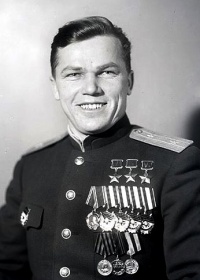
Media
- Skins
- Images
See also
Links to the articles on the War Thunder Wiki that you think will be useful for the reader, for example:
- reference to the series of the aircraft;
- links to approximate analogues of other nations and research trees.
External links
| Lavochkin Design Bureau (Лавочкинa Опытное конструкторское бюро) | |
|---|---|
| LaGG-3* | I-301 · LaGG-3-4 · LaGG-3-8 · LaGG-3-11 · LaGG-3-23 · LaGG-3-34 · LaGG-3-35 · LaGG-3-66 |
| La-5/7 | La-5 · La-5F · La-5FN · La-7 · Dolgushin's La-7 · La-7B-20 |
| La-9/11 | La-9 · La-11 |
| Jet Fighters | La-15 · La-174 · La-200 |
| Export | ␗La-9 · ␗La-11 |
| Captured | ▀La-5FN |
| *Lavochkin-Gorbunov-Gudkov (Лавочкин-Горбунов-Гудков), head designer V. P. Gorbunov | |
| USSR fighters | |
|---|---|
| I-15 | I-15 WR · I-15 M-22 · I-15 M-25 · I-15bis · Krasnolutsky's I-15bis |
| I-153 M-62 · Zhukovsky's I-153-M62 · I-153P | |
| I-16 | I-16 type 5 · I-16 type 10 · I-16 type 18 · I-16 type 24 · I-16 type 27 · I-16 type 28 · I-180S |
| I-29 | I-29 |
| I-185 | I-185 (M-71) · I-185 (M-82) |
| I-225 | I-225 |
| ITP | ITP (M-1) |
| MiG-3 | MiG-3-15 · MiG-3-15 (BK) · MiG-3-34 |
| LaGG | I-301 · LaGG-3-4 · LaGG-3-8 · LaGG-3-11 · LaGG-3-23 · LaGG-3-34 · LaGG-3-35 · LaGG-3-66 |
| La | La-5 · La-5F · La-5FN · La-7 · Dolgushin's La-7 · La-7B-20 · La-9 · La-11 |
| Yak-1/7 | Yak-1 · Yak-1B · Yak-7B |
| Yak-3 | Yak-3 · Eremin's Yak-3(e) · Yak-3P · Yak-3T · Yak-3U · Yak-3 (VK-107) |
| Yak-9 | Yak-9 · Yak-9B · Golovachev's Yak-9M · Yak-9T · Yak-9K · Yak-9U · Yak-9UT · Yak-9P |
| Other countries | ▂P-40E-1 · ▂P-47D-27 · ▂Hurricane Mk IIB · ▂Fw 190 D-9 · ▂Spitfire Mk IXc |
| P-39 | ▂P-39K-1 · ▂Pokryshkin's P-39N-0 · ▂P-39Q-15 |
| P-63 | ▂P-63A-5 · ▂P-63A-10 · ▂P-63C-5 |


